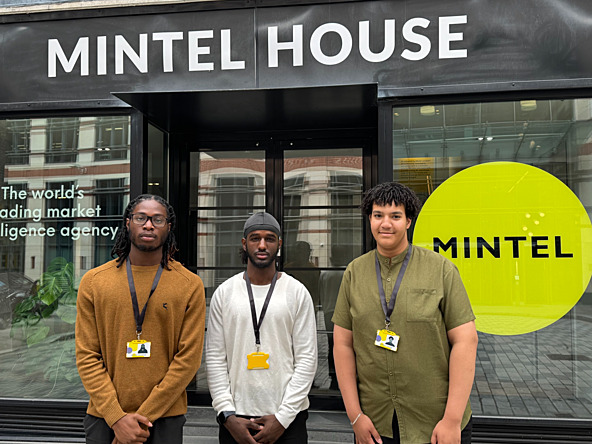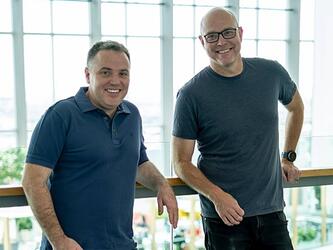A foot in the door: Building a research internship

(Pictured: Prince Eduzo, Adnan Dahir and Ahmed Taha from the 2025 Mintel summer internship intake)
What was the intention behind the paid internship programme when it was developed in 2020?
At the time [of the 2020 Black Lives Matter protests] there was a feeling of frustration and being overwhelmed, but also individually asking ‘what is the role I can play in all of this?’. I was trying to work out how I could make a difference. It was a very America-centric conversation, and I took it on myself to say to our CEO at the time that [inequality] is not just a US issue, that there are disparities faced by young black people right here in this country. If you look at where Mintel is based in the City of London, there are young people in the boroughs surrounding that very much feel excluded the commerce, way of life and employment that happens just miles from their home.
Why did you move from a mentorship programme?
We were there for the tough period where the young people were not able to mix and mingle in colleges, but as the world opened up again, virtual mentorship became less relevant, and what I wanted to do was give paid opportunities to these young people. It is really important to me that we did something that was remunerating young people, as what I have often found is that people from ethnic minorities or marginalised backgrounds can’t access some of these provisions as they are unpaid, and they need to be making money. It often leads to them not taking the opportunity or taking on other work in the evenings and at weekends.
I was given the opportunity when I was young – I did my internship programme at Sainsbury’s head office, and it changed a lot for me. I got to rub shoulders with product developers. I did really well, they called me back in my summer holidays and I ended up going back to Sainsbury’s to do its graduate programme. You never know where these internships could lead you in terms of your aspirations, and it is a real passion project for me because I am a testament to the fact that these things work.
What sort of tasks have the interns carried out on the programme?
We’re really mindful of the ages of the students we are taking – we take people aged 16 to 18, which can be anyone from school leavers to those just heading to university, and anywhere in between. We want to give them a taste of multifaceted life in a market research company. We have had interns who have written whole reports and had them published. It has been fascinating to see how ready to go some of these young people are, in terms of having an opinion, being able to apply the research techniques we are teaching them and hitting the ground running.
I always say that, rightly or wrongly, the internship programme is a safe place for people to fail. It is a safe place to decide they don’t like research or marketing. We don’t have too much expectation in terms of what they choose to do and the lanes they need to stay in. This is their chance to get their foot in the door, speak to people and find if you have an affinity [with their work].
One of our interns this year is in our legal department, and it is really hard to get legal internship placements, and difficult for ethnic minorities especially. This young man had an idea that he maybe wanted to be a solicitor, but now that he is working with our in-house legal team and with his manager, who is training to be a solicitor, he has learned exactly the steps he has to go through. Those conversations, more than anything, have been so invaluable to him as he now has a tangible path to what he wants to do. That’s the kind of thing that I think is so valuable – contacts. Make connections – you never know who is watching or when that connection might come into play later on in your career.
How the relationship been with the charity you work with?
Voyage Youth is the charity we work with on this programme, and it is headquartered in Hackney Community College. When I got the green light [for the project], I was looking for an inner city London charity that supported young black people. This was the middle of the pandemic, and for charities it was a really difficult time. There were issues with getting access to young people, as some did not have laptops and the money wasn’t coming in for them to do outreach. I had a conversation with Paul Anderson, who heads up Voyage, and he was so aligned and really open to working with us.
We have done so much with Voyage – including volunteering as coaches to support young entrepreneurs with their business ideas, running CV workshops, and doing a Dragons’ Den-style challenge where students used our consumer data and tools to develop products. Our two organisations are very well aligned now.
What has the impact been on the interns?
The stories I love the most are when people come in and they are really quite shy, they are acting their age, they’re young and haven’t been in this environment before. On their final day, after being with us for five weeks, they do a presentation on their time with Mintel in our theatre. Members of the board are there, people that have worked with them will be there, Paul comes from the charity, it’s quite a big deal. It is always quite daunting for the students learning about this presentation in week one, but we give them presentation skills to help them along the way, and by week five, watching them walk into the theatre and deliver these presentations with such grace, poise and confidence is wonderful. In just five weeks, you see people grow.
The other things they get from it is clarity on what you want to do, or clarity on what you don’t want to do. You might decide that this type of environment is not for me, and that to me is just as valuable as thinking it is for you. I hope they come away with experience they can use to go out and get their next job.
What has the impact been on the organisation?
There has been so much goodwill, and I get people coming out of the woodwork volunteering [to take an intern]. Often when I speak to the line mangers of the interns, they will say they probably learned more from the young person than the students did from them, as they come with fresh perspectives. We have consumer data from talking to Gen Z, but to have them here and giving their own opinions is fantastic.
I am trying to keep the issue alive; we have a long way to go in terms of multiculturalism, equality and equity, and I don’t want anyone to think the work is done – it is not done, it is an ongoing thing. We have seen a lot of organisations stepping away from their diversity and equity commitments, and I am proud Mintel is doubling down on it and standing on what we said we would do.
What lessons have you drawn from the internship programme?
Personally, I have had so many lessons. It has taught me patience – working with charities and young people is not for the weak. Don’t let the pursuit of perfectionism get in the way of doing something that is fantastic; things don’t always go to plan. Don’t try to be perfect, just get it done. It just takes one person to speak up and have a vision and a bit of drive, and if it is a worthy cause people will support you and help. Don’t be afraid to be the one person to say ‘I think we should do this’, because it can lead to fantastic things.
You can get ‘whataboutery’. My answer to that is ‘go and build it’ – if you think a group of people need our support in some way, make your case and go and build it. It is all too easy to say ‘that group has got this, and we should have the same’. Every group needs support in different ways. I have identified inclusion in the workplace for young black people as that is a specific issue. This is a tailor-made help for the needs of this community; if other communities need that support, I completely support that – go and build it. Equity doesn’t mean you treat everyone the same – you look at the needs of a specific group and you tailor to those needs. I hope this inspires other people to do similar things. Don’t be scared, just do it.

We hope you enjoyed this article.
Research Live is published by MRS.
The Market Research Society (MRS) exists to promote and protect the research sector, showcasing how research delivers impact for businesses and government.
Members of MRS enjoy many benefits including tailoured policy guidance, discounts on training and conferences, and access to member-only content.
For example, there's an archive of winning case studies from over a decade of MRS Awards.
Find out more about the benefits of joining MRS here.














0 Comments